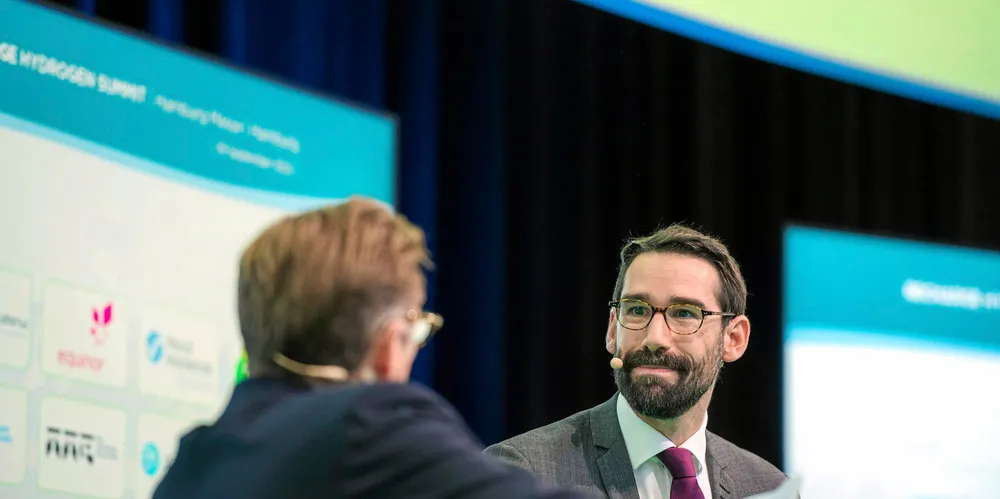EXCLUSIVE | 'These are the five bottlenecks holding up green hydrogen in Europe that must urgently be resolved'
Scrapping the delegated act was 'totally wrong' and demand for clean H2 will not be a problem, Renewable Hydrogen Coalition tells Recharge summit

There are five bottlenecks holding up progress on a green hydrogen ecosystem in Europe, almost all of them connected to the ramp up of renewable energy, according to the Renewable Hydrogen Coalition (RHC).
Permitting
Top of Paquet’s list is permitting for renewables projects to produce green hydrogen.
“Any government serious about the ramping up of renewable hydrogen or renewables has to tackle this issue,” he said. “We need faster, simpler permitting. Every procedure needs to be accelerated.”
Permitting for wind and solar projects in European countries typically take around six to nine years, according to the EU, which is encouraging member states to introduce “renewables go-to-areas” with the aim of reducing permitting to one year.
“We cannot accept ten years for building a wind farm,” Paquet added. “It needs to take two years maximum to get all the permitting done.”
But the RHC, which is spearheaded by Iberdrola chief executive Ignacio Galán, is optimistic that European authorities will act to avert the permitting and planning problems experienced by renewables developers.
“I’m fairly confident because there is a learning curve now there,” Paquet told the Hamburg audience. “Let’s not repeat the mistakes of the past.
Value chains
Second, Europe needs to take lessons from the supply-chain disruption caused to the renewables sector by the Covid-19 pandemic and invest in creating strong value chains for hydrogen producers, Paquet said.
“We need to have a value chain that is capable of catering [for the] enormous volumes that we’re talking about,” he said. “We need to learn from Covid [and] the shortages we have seen. We need to make sure we build value chains that have secured unrestricted access to those core components and raw materials; we need to make sure we deliver on ambition.”
Skills
Further investment also needs to be made in developing skills for both the renewables sector and the hydrogen industry, Paquet added.
“It’s about time we got the talents and the people,” he continued. “We need massive training programmes to make sure we have the right talent doing the job on the ground.”
Regulation
A fourth bottleneck is the lack of a firm regulatory framework, which the industry needs without any further delay, the RHC’s impact director warned, going on to slam as “totally wrong” the derailment of the European Commission’s delegated act, which would have enshrined in law a strict definition of green hydrogen.
“The definition, this delegated act, is the central piece of the missing pieces we need, because that will be used to develop the support schemes that we need to accelerate,” he said.
In the absence of a delegated act, European producers would have to wait for a framework contained within an overhaul of the massive Renewable Energy Directive II (RED II), which the EU is not expected to finish for another two and a half years.
“We are now leaving the industry in limbo with no rules,” Paquet said. “We know that financial investment decisions have already been postponed. We need it now. The timing counts. We cannot afford another 2.5 years but we cannot afford another six months. It needs to start now.”
Level playing field
Lastly, Paquet called for fair conditions for Europe-based manufacturers across the green hydrogen supply chain — for example those making components for wind turbines, solar PV or electrolysers — who will be competing with manufacturers outside EU borders, including those from China.
“Let’s be clear: it’s about sustainable manufacturing, social standards, environmental standards,” he told the summit. “When we think in terms of competition, here in Europe we have high-quality manufacturing. We need to make sure the same rules apply also to the global competition.”
“Other areas to look at, for example, include the design of auctions for renewables — or any future ones for renewable hydrogen,” she said. “There, looking only at prices is no longer sufficient. Beyond quantitative criteria, auctions should also integrate qualitative criteria related to environmental and social dimensions.”
Demand in the bag
But the hydrogen industry does not need to worry about European demand on account of the RED II’s target to shift at least 50% of current hydrogen production from grey to green — which would be a “game changer”, Paquet said.
“I’m reasonably optimistic that the demand is not so much the issue today, it is fairly easy,” he told the audience, noting that Europe’s current hydrogen demand is 8.4 million tonnes.
The remarks undermine the argument often put forward for blending hydrogen into the gas grid, which proponents claim could create guaranteed demand to support green hydrogen projects — the RHC’s position suggests that regulation and permitting are far greater hurdles.
(Copyright)